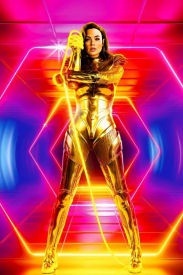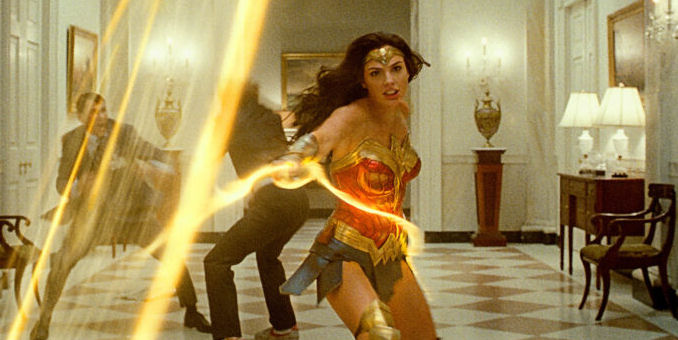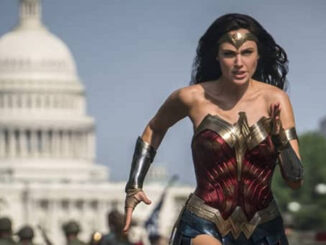 It has been seven decades since the warrior Diana (Gal Gadot) first ventured from the hidden island of the Amazons, Themyscira, to the outside world and defeated the Greek god Area who had used his influence over mankind to start World War One and became known to the small group who helped her as Wonder Woman. She has become an anthropologist for the Smithsonian, specializing in ancient Mediterranean cultures of course, and has just befriended the newly hired, and somewhat socially awkward, Barbara Minerva (Kristen Wiig). After Diana foils a robbery at a jewelry store that was a front for a black market trade in antiquities, the FBI consult with Minerva on the value of many of the seized items.
It has been seven decades since the warrior Diana (Gal Gadot) first ventured from the hidden island of the Amazons, Themyscira, to the outside world and defeated the Greek god Area who had used his influence over mankind to start World War One and became known to the small group who helped her as Wonder Woman. She has become an anthropologist for the Smithsonian, specializing in ancient Mediterranean cultures of course, and has just befriended the newly hired, and somewhat socially awkward, Barbara Minerva (Kristen Wiig). After Diana foils a robbery at a jewelry store that was a front for a black market trade in antiquities, the FBI consult with Minerva on the value of many of the seized items.
Enter Max Lord (Pedro Pascal), an oil company magnate who is very much in the public eye with promises of wealth to anyone who invests in his company. One of the black market artifacts seized by the FBI, the Dreamstone, was destined for him. A magical object, it is able to grant a person one wish, although that wish comes with a cost. Lord romances Minerva so he can gain access to the Dreamstone for his own purposes, but not before she inadvertently wished to be as confident and powerful as her new friend Diana. Diana, for her part, makes her own accidental wish for the return of her love from the first film, Steve Trevor (Chris Pine). Once she realizes the danger that the Dreamstone represents, Diana and Steve set out to retrieve it from an ever increasingly powerful Lord and Minerva.
And so is the set up for Wonder Woman 1984, the follow-up to the superhero’s first solo onscreen adventure from 2017. Directed by Patty Jenkins, who is back for this second installment, the previous film was praised for its strong characterizations and action. In my own review, I praised it for its sharp focus on Diana’s character and her hero’s journey. Unfortunately, this time around the screenplay co-authored by Jenkins, comics scribe Geoff Johns and David Callaham doesn’t have quite the sharpness of Allan Heinberg’s work from the last film.
The performances here are for the most part pretty good. Gadot continues to do some fine work as the Amazonian superheroine, though the script misses out on a good opportunity for her. After Diana and Steve are first reunited, she makes a comment about him not knowing what it has been like to have lived alone, and by inference watching her comrades from the first film grow old and die while she has spent the decades missing him. That is some fertile ground for drama and characterization that the film doesn’t give Gadot a chance to explore.
Pine’s breezy charisma helps to make the obligatory but thankfully short fish-out-of-water/adjusting-to-the-future portions of his character arc seem not as tedious as it could have been. These story beats are also a nice reversal of Diana’s astonishment and curiosity when she first arrives in the world of men in the first film. Thankfully, Jenkins allows these scenes to play out on their own and never calls attention to their parallel.
While Wiig is known mainly for her broad comedy work on Saturday Night Live and in film, she does work here that pushes her into a zone we haven’t seen her operate in since 2014’s The Skeleton Twins. She of course does the light comedy of Klutzy awkward scientist well, but when the script needs her to come across more serious and menacing she delivers.
The real let down of the four leads is Pascal. His Max Lord seems inflated in a way that teeters on the brink of cartoonish and manages to topple right over into it in the third act of the film.
Thematically, the film is a bit muddled. The opening segment, a flashback to Diana’s home of the hidden island of Themyscira and an athletic competition she participated in as a girl, sets up a particular life lesson that the future-superhero will be told, but one which she will only learn through the course of this film. And while there is a payoff to this setup, the script never fully develops the dramatic tension that should give it the emotional weight it was lacking when it finally came.
If anything, Wonder Woman 1984 is about greed, the desire to always want more. And the 1980s, the decade where Michael Douglas told us “Greed is good,” certainly seems like a well chosen decade to set it in. Max Lord is driven by it. (His media catchphrase is “Life is good… But it can be better!”) The numerous wishes we see him grant are all driven by it. We never really see anyone selflessly wishing for something for someone else. Is a repudiation of that era of greed three and a half decades late in coming? Not really. Greed wasn’t new to the 1980s, even though it seems as if it were codified as not quite the vice it had been previously regarded as in that decade. It is still a theme that we can see echoes of today. As Lord intones “I am not a conman. I am a television personality with a business plan,” it is hard to not make a cursory comparison to Donald Trump. And if that was the intention, it is easy to see why Warner Brothers didn’t want to wait any further in getting this front of the public.
Jenkins still stages her superheroics well. Special note should be made of the depictions of Diana’s heroics when she is trying to remain incognito. Whether it is saving a jogger from a speeding sports car or stopping a late-night mugging, the short, quick sequences are staged in a way that leaves the audience knowing who is responsible but understanding how those involved could be clueless to what actually happened.
Refreshingly, even though the finale once again involves the standard superhero film trope of a potentially world-ending McGuffin, the problem is not solved through Wonder Woman just punching something. Instead, Diana appeals to the better nature of humanity in a way that speaks more towards her character than much of the previous two hours and change did. And it is that optimism in man-and woman-kind that is something that we could perhaps carry forth into the new year.





